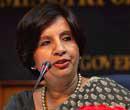
The recently concluded annual strategic dialogue between India and the US had led to several important advancements in their strategic partnership, she wrote in "The Hill", an influential Washington newspaper focusing on Congressional politics.
"These include enhanced cooperation on many fronts, including in health and education for sustainable development, in the effort to bolster energy security and in the quest to improve business-to-business relations between our two nations," Rao said.
Secretary of State Hillary Clinton had hailed a preliminary agreement between Westinghouse and the Nuclear Power Corporation of India on setting up a nuclear power project to generate electricity, in Gujarat State as "a significant step toward the fulfilment" of the landmark 2008 nuclear agreement between the US and India, she noted.
"We agree, and would add that there was a lot more progress to highlight in other realms, too," Rao said underlining that India's External Affairs Minister S.M. Krishna, emphasised that the US and India will continue to make progress and work in tandem on many issues especially in trade and business.
On trade, the two leaders announced that they would work toward completing a bilateral treaty that would boost investment and trade between the US and India. Cooperation on defence-related matters, maritime and Internet security, counter terrorism and trade would also be taken forward, Rao said.
Another major area of common purpose concerned Afghanistan, she said noting the US and India have been working separately to find ways to ensure Afghanistan's long-term peace and stability.
"Today, the path is open for closer coordination as India and the US now plan to work together -- along with Afghanistan -- to promote improvements in Afghan farming, mining, energy and infrastructure," Rao wrote.
"This new, trilateral effort is yet another demonstration of the like-mindedness of the US and India on security issues and their joint determination to do even more to prevent the spread of worldwide terrorism."




Comments
Add new comment